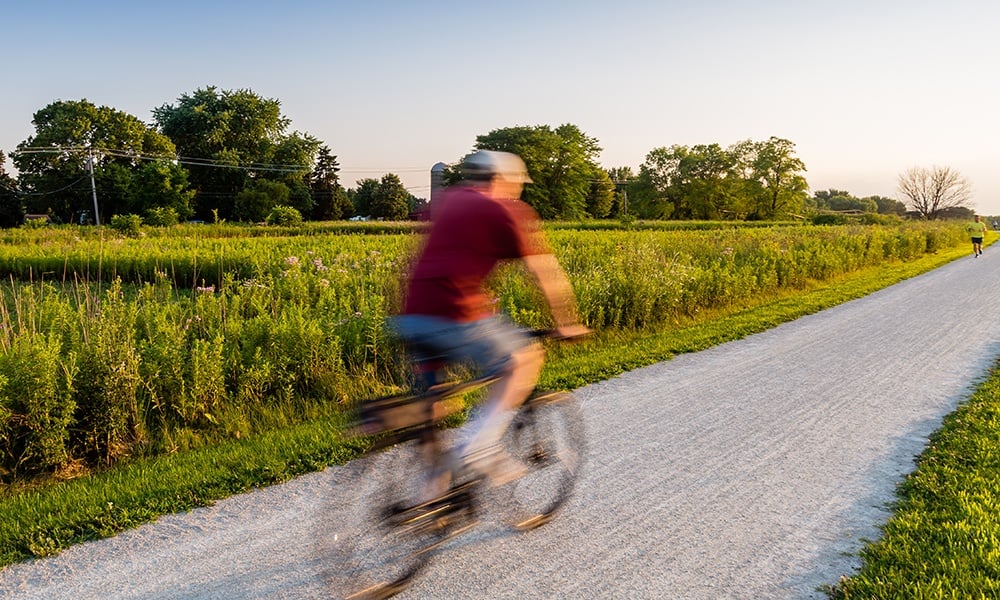
DuPage forest preserve trails are popular with all kinds of visitors: some on foot, some on wheels and others on horseback.
Trails help people get closer to prairies, woodlands, wetlands, lakes and rivers and offer 166 miles of varied terrain, including crushed limestone (the most common), turf, asphalt, wood chips and back-area footpaths.
Maps showing trails, restrooms, drinking water and alternative trailheads are available on our website, forest preserve pages and at information kiosks at most forest preserves.
Trail Benefits
Trails not only offer fresh air and the sounds of nature but also give you the opportunity to experience the peace and tranquility found only at a DuPage forest preserve. They let you “unplug” and look and listen for the latest in the great outdoors. (You wouldn’t want to miss a deer grazing a few feet off the trail because you’re checking your Facebook page, would you?)
They give you “bonus” ways to learn about plants and animals, either by pausing to read an interpretive sign or joining a ranger-led hike, and when you’re in need of rest or a place to sit and relax, they’ve got trailside benches waiting just for you.
Trail Tips and Etiquette
The most important thing to remember on any trail is to be safe, and part of being safe is being courteous. Here’s how!
- Keep to the right to allow for two-way traffic. If you’re running or biking in a group, go single file. This allows others to easily pass with a clear line of sight.
- Always pass on the left and make sure you can see what’s ahead of you before you do. And don’t be shy: Loudly announce to other trail users (some who may be wearing headphones) that you’re “passing on the left.”
- When meeting different types of trail users, remember: First yield to horses, then to hikers and then to bikers. Because of their nature, horses always get the right of way, and because people on foot are slower than those on wheels (and can’t maneuver as quickly) they get preference next.
- When allowing a horse and rider to pass, stand quietly aside and ask politely if you are in a good place. Always ask permission to pass a horseback rider on the trail.
- Only ride bikes on trails marked for bicycle use. In most cases, these are the nice 8-foot-wide crushed limestone trails you see at most preserves. When in doubt, check the forest preserve’s map. Rangers often see bicyclists lured by the thrills of narrow dirt paths, but biking on these trails is illegal and dangerous, especially for hikers who aren’t expecting to encounter someone on two wheels.
- When you do find the perfect bike trail, travel at a safe speed and slow down as you near other visitors, go around corners or travel downhill.
- Consider leaving your earbuds at home. We all love to tune in to our favorite music while jogging, but listening to the sounds of the forest preserves frees your senses and lets you hear other visitors who might be getting ready to pass.
- Plan on bringing Spot, but remember that dogs must be on leashes under 10 feet long and may not be allowed on trails in ecologically sensitive areas. If you do bring your pup, please keep it next to you on the same side of the trail; it makes things safer for your pet and for other visitors. And remember, no matter where you are in a forest preserve, it’s your responsibility to “scoop the poop.”
- Share the trails with DuPage County’s wildlife, and respect the irreplaceable forest preserve habitats they call home.
- Finally, use trash containers and recycling bins, and pack out anything you pack in. If possible, leave the forest preserves cleaner than they were when you arrived.
We hope you’ll take time to enjoy the county’s forest preserve trails and to do what you can to make the experience as safe as possible.